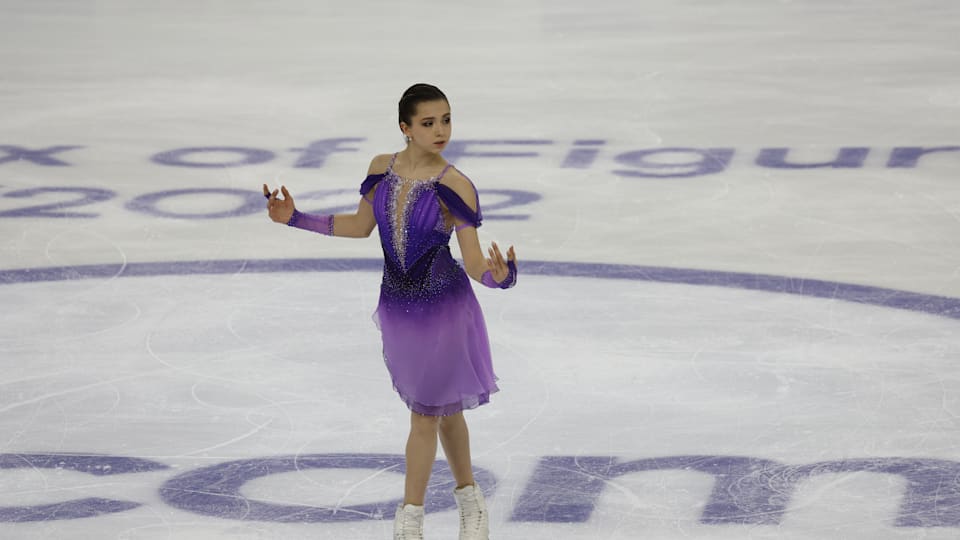World record holder Kamila Valieva: 'Rivalry is always good'
Valieva - along with world champion Anna Shcherbakova and world medallist Alexandra Trusova - is looking to book a spot at next month's Winter Olympics.

As women's figure skating has grown by leaps and bounds - technically - in the last two Olympic cycles, Russian teenagers have been at the center of the charge.
The current world record total score (272.71) is held by 15-year-old Kamila Valieva, who last month claimed her first Russian national title in her debut season on the senior international circuit.
With many of her teammates also a part of the Eteri Tutberidze-led group in Moscow, including reigning world champion Anna Shcherbakova and bronze medallist Alexandra Trusova, Valieva says the competition among the teens is something that pushes them to be better.
"Rivalry is always good, in all sports," Valieva said last month after winning the Russian nationals. "And it probably pushes you forward."
Shcherbakova, 17, agreed.
"You want to keep up with that level [of others] and continue staying in shape," Shcherbakova said, before turning her attention to what has been the standard for top performers in recent history: Quadruple jumps.
"I will dedicate the maximum amount of training time for quad jumps and at the future competitions I will try to complete all the combination of jumps, making them more advanced."
Each of Valieva, Shcherbakova, and Trusova hope that "future competitions" will include next month's Olympic Games Beijing 2022. The three skaters each need to confirm their spots on the three-woman ROC team, which has the potential to sweep the podium at the Olympics.
They compete this weekend (13-15 January) at the European Championships. The ROC team will be named thereafter.
Valieva's fast rise
Much like the Olympic champion at PyeongChang 2018, Alina Zagitova, Valieva's senior debut is timed just right: She's in her first year in the senior ranks - and could rocket to gold in Beijing.
With both Zagitova and 2018 silver medallist Evgenia Medvedeva as mentors, Valieva has a measured approach at a young age.
"We live in this moment, in the present and to think about the Olympic Games even when they are just around the corner... there's probably no point in that," she said during Russian nationals.
She added: "[Now] we will be working and preparing for the European Championships. And that's probably it."
There has been criticism towards a scoring system that rewards big jumps with bigger points: Valieva's 272.71 at Rostelecom Cup in November featured a triple Axel in the short program as well as the free skate, the latter which included three quad jumps - a Salchow and two toe-loops in combination.
Yet does that big-jumping, big-rewards approach balance the artistry and nuance that the sport of figure skating also holds dear?
Valieva says she and the other senior women are aware of what's coming next (more quads), so they must do their best to maintain - and continue to grow: "When you know what's happening next, that the girls are coming out the next season and most of them already have quadruple jumps, triple Axel... [then] your task is to continue working, to support yourself."
History approaches in Beijing
While each of Valieva, Shcherbakova, and Trusova will aim to compete at the Olympics, the technical push has been steady and steep: Only as recent as the world championships in 2019 did the now-retired Elizabet Tursynbaeva land the first quad in senior international competition, a quad Salchow.
"[Since then] a lot has already changed," Shcherbakova said last month, referring to Russian nationals in 2018. "If at the time when we did quads - it seemed as something incredible. [But] now it's really normal."
Not "normal" however, as only Japan's Kihira Rika was consistently putting out quads on the senior circuit, the 2018 Grand Prix Final champion who did not qualify for the Games due to injury.
No matter who lands it in Beijing, the first landed and fully-rotated quad will make history next month at the Olympics: A first of its kind on Olympic ice.
Elizaveta Tuktamysheva, the 25-year-old who was a world champion in 2015 and won the silver in 2021 was one of the few anomalies: A twenty-something skater with over a decade on the international circuit who was also still putting out quads and triple Axels.
She placed seventh at Russian nationals, however.
Tuktamysheva said her jumping ability came from a simple ingredient: Self-belief.
"I try not to constrain myself,” she said in an interview earlier this season. “This is my secret to longevity: I hate limits; limits for me are the worst things.”
